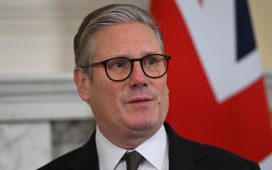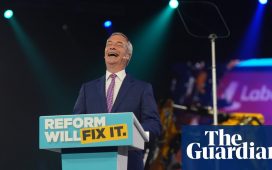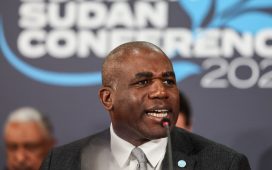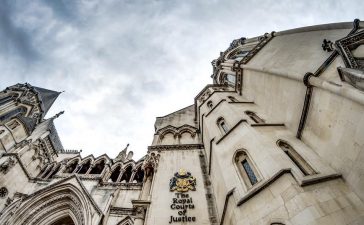Brexit damaging UK growth more quickly than expected, says Bank of England
Brexit is damaging UK growth more quickly than expected, the deputy governor of the Bank of England said today.
At a news conference to explain today’s interest rate decision, Ben Broadbent said it was still not clear whether the effects of EU withdrawal were a reason why the UK is forecast to do worse than other major economies this year.
He said the Bank has not changed its overall assessment about Brexit having a negative effect on growth. But he said they had not expected to see the impact come throught so quickly. He explained:
Brexit … has been something that has pulled on our potential output in our country and that’s been our assessment for many years.
We’ve not changed our estimate of the long-running effects, but we’ve brought some of them forward and we think they’re probably coming in faster than we first expected ….
Yes it [Brexit] is having some effect on growth, although ultimately no bigger effect than we assessed some years ago.
Based on the numbers for trade and some degree for the numbers on investment, we think these effects are coming through faster than initially envisaged.
Overall, as PA Media reports, the Bank said that while it believed the UK was still heading for a recession, the downturn may be shorter and shallower than previously expected.
In its monetary policy report today the Bank says:
The effects of Brexit on trade are now estimated to be emerging more quickly than previously assumed, and that lowers productivity somewhat.
Andrew Bailey, governor of the Bank, said at the press conference that Brexit was one of a series of “significant economic shocks” to have affected the economy, along with Covid and the war in Ukraine. He went on:
These shocks have held back both productivity and labour supply.
Key events
Filters BETA
Here is a Guardian video of Chris Heaton-Harris, the Northern Ireland secretary, announcing the inquiry into the Omagh bombing in the Commons earlier.
NIO sets out four issues to be covered by new inquiry into Omagh bombing
The Northern Ireland Office has published further details of the statutory inquiry it is setting up in to the Omagh bombing. The inquiry is going ahead in response to a court judgment ruling that, under the European convention on human rights, some form of investigation was needed. The legal case was brought by Michael Gallagher, whose son Aiden died in the bombing.
The NIO said in a news release:
The Real IRA claimed responsibility for the Omagh Bombing in 1998, and four members of the Real IRA were subsequently found liable for the bombing in civil proceedings held in Northern Ireland. This inquiry does nothing to counter these findings, which are clear in who was responsible for this awful atrocity.
The independent statutory inquiry will examine the four issues identified by the high court; the handling and sharing of intelligence, the use of cell phone analysis, whether there was advance knowledge or reasonable means of knowledge of the bomb, and whether disruption operations could or should have been mounted, which may have helped prevent the Real IRA’s attack.

No 10 dismisses Boris Johnson’s claim Ukrainian pilots could quickly learn to fly western fighter jets
Yesterday Boris Johnson, the former PM, implicitly criticised the UK government for not supplying Ukraine with military jets. No 10 has argued it would take too long to train the pilots, but Johnson told the Atlantic Council thinktank:
I hear that an objection to their having sophisticated western planes to fly is that they wouldn’t know how to use them.
I have to say, I take that argument with a bit of a pinch of salt.
I don’t think it’ll take the Ukrainians very long to work out how to use F-16s or Typhoons or whatever we have to give them.
Asked about Johnson’s comments, the PM’s spokesperson told journalists at the lobby briefing that the fastest training programme for a jet pilot took around three years, and that five years was normal. He said:
We will continue listening to the Ukrainians and consider what is right for the long term.
But it’s helpful to understand the situation, that the fastest training programme for a new pilot is approximately 35 months.
The current UK fast jet training programme takes five years.
Downing Street refuses to comment on claims Raab officials had mental health crises
Downing Street refused to comment on Dave Penman’s claim that some officials who worked for Dominic Raab suffered mental health crises. (See 10.01am.) Asked about what the FDA general secretary said, the PM’s spokesperson said:
The prime minister felt that once formal complaints were raised, it was right to have an independent person, a respected KC, to look into it. That’s what’s happening now.
I’m not going to comment on the reports, seeing as that process is taking place.
No 10 says revelations about British Gas forcing vulunerable customers on to prepayment meters ‘deeply shocking’

Jessica Elgot
At the lobby briefing the PM’s spokesperson said the Times revelations about British Gas forcing customers to have prepayment meters (see 9.17am) were “deeply shocking and concerning”. He went on:
Vulnerable families should not be treated so poorly.
The findings suggest British Gas has failed to use every possible avenue to support those struggling with their energy bills, as they rightly deserve and are entitled to.
Graham Stuart, the energy minister, is due to meet executives from British Gas to discuss the situation this afternoon.
It is understood that Stuart called the Ofgem chief executive, Jonathan Brearley, early this morning to discuss the revelations. Sources at the business department said Stuart demanded Ofgem explain their role in this and ensure they take urgent remedial action. They said ministers were particularly keen to ensure the regulator asked “more searching questions” of the energy companies during their future investigations.
No 10 defends current level of windfall tax after Labour says it should be higher
At the Downing Street lobby briefing the prime minister’s spokesperson defended the current scope of the windfall tax on energy companies. Labour says the profits declared by Shell today show why it should be higher, or more extensive. (See 9.17am.) Asked about this issue, the PM’s spokesperson said:
We recognise that the public will think these are extraordinary profits, clearly. That’s why once it was clear that there would be a windfall because of various factors including the war in Ukraine, we put in place the energy profits levy.
The new headline 75% tax rate is comparable with other North Sea tax regimes including Norway, and we think that strikes a balance between funding cost of living support while encouraging investment in order to bolster the UK energy security.
The spokesperson also said there were no plans to increase the windfall tax.
Labour says plan to reform social care system for children does not amount to ‘radical reset’ needed
The Department for Education has today unveiled plans to reform the social care system for children in England. My colleague Patrick Butler wrote a preview of the plans here.
Here is the DfE’s news release. And here is the ‘Stable homes, built on love’ strategy and consultation document.
Responding to a Commons statement about the plan, Helen Hayes, the shadow children’s minister, said this did not amount to the “radical reset” that was needed. She said:
While some additional funding is welcome, this is not the radical reset the review demanded and which we need.
There is no vision for the direction of children’s social care, there is no ambition for our most vulnerable children, there is no cross-cutting commitment from the top of government to deliver better for every child and every care-experienced person in every part of our country.
This government has spent months legislating to restrict the fundamental rights to protest and to strike but has chosen not to make time to legislate to strengthen protections for children.
In response, Gillian Keegan, the education secretary, said the plans were the “start of the journey” and the government needed to consider what worked and what didn’t.
Northern Ireland secretary announces statutory inquiry into Omagh bombing
Chris Heaton-Harris, the Northern Ireland secretary, has told MPs in a statement that the government will establish an independent statutory inquiry into the Omagh bombing in 1998, which killed 29 people, including a woman pregnant with twins.
Lisa Nandy, the shadow levelling up secretary, says that a year ago today, when the government published its levelling up white paper, Michael Gove, the levelling up secretary, promised an annual report setting out the progress made towards the goals set out in the document.
She has written to Gove asking why we haven’t had it yet, saying this is “the latest in a long line of broken promises on levelling up”.
Today marks one year since the Levelling Up White Paper, the government’s big plan for its flagship agenda.
It promised an annual report on the government’s progress, but no report has been forthcoming.
✍️ I’ve written to Michael Gove asking where it is. pic.twitter.com/4ILuP5ZcSB
— Lisa Nandy (@lisanandy) February 2, 2023
Rachel Reeves says interest rate hike amounts to ‘Tory mortgage penalty’
Rachel Reeves, the shadow chancellor, claims today’s interest rate hike (see 12.18pm) amounts to a “Tory mortgage penalty”. In a statement she says:
With households already paying a Tory mortgage penalty, families across the country will be worried about what rising interest rates today mean for them.
The reality is that under the Tories, growth is on the floor, families are worse off and we are stuck in the global slow lane.
We do not have to continue on this path of managed decline when Britain has so much potential to grow and thrive.
Hunt welcomes Bank’s decision to raise interest rates to 4%, saying it will help government to halve inflation
Jeremy Hunt, the chancellor, has issued a statement backing the Bank of England’s decision to raise interest rates by 0.5 percentage points, to 4%. He said this would help the government achieve its aim of halving inflation this year. He said:
Inflation is a stealth tax that is the biggest threat to living standards in a generation, so we support the Bank’s action today so we succeed in halving inflation this year.
We will play our part by making sure government decisions are in lockstep with the Bank’s approach, including by resisting the urge right now to fund additional spending or tax cuts through borrowing, which will only add fuel to the inflation fire and prolong the pain for everyone.
My colleague Graeme Wearden has more on his business live blog.
Only third of voters think Sunak has been better PM than Boris Johnson, poll suggests
The Times has commissioned polling to mark Rishi Sunak’s 100 days in office, and, if anything, it will make even gloomier reading for Downing Street than the Guardian write-through. (See 11.41pm.) The Times reports:
Seven in ten (72 per cent) believe he will not be prime minister after the next election, while just 27 per cent think he has done well so far. However, the YouGov polling also found that by a margin of 14 points voters think Sunak has been a better prime minister than Johnson.
Here is the Times graphic showing whether voters think Sunak is doing well or badly on five key issues.

Almost two thirds of people think Sunak is a better prime minister than Liz Truss, the poll suggests. But only a third believe that he is better than Boris Johnson. (By the time he left office, Johnson was mired in scandal, and his ratings were dire, and if a majority of people think Sunak is no better, then he is in real trouble. But perhaps people responding to this question are thinking of the Johnson premiership in its totality, and giving him credit for things like the vaccine programme.)











